James Brown
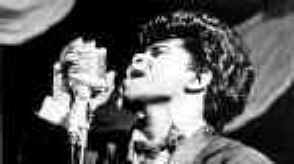
Probably the single most popular black artist among blacks till
the mid '70s, James Brown may very well have been the last
vaudeville performer, with is high powered, histrionic, and
intensely dramatic stage show. James Brown was perhaps the best
known and clearly the most successful black entertainer of the
Sixties and the early Seventies

Born May 3, 1933 in Barnwell, South Carolina,
Brown took up keyboards, then drums and bass at an early age.
Dropping out of school in the seventh grade Brown picked cotton,
shined shoes, danced for pennies in the streets of Augusta,
Georgia and stole. Convicted of armed robbery at the age of 16,
he spent three years in a juvenile detention facility. It was
there that he met Bobby Byrd, who with his family gospel group
visited the institution to perform. Byrd's family helped get
Brown released by taking him in and getting him a job. brown
tried semiprofessional sports, first as a boxer, then as a
baseball pitcher, but a leg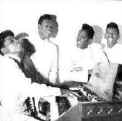 injury ruined his chances of going pro. In the meantime,
Brown and Byrd put together a gospel group, that performed under
a number of names at the Mt. Zion Baptist Church in Tocca,
Georgia and at auditoriums in the area. Byrd and Brown sang duets
with three or four other members singing background vocals and
harmonies. After seeing a rock and roll show featuring Hank
Ballard and the Midnighters, Fats Domino, and others Brown and
Byrd quit gospel music, transforming the group into the Flames.
Each Flame sang, danced and played an instrument or two. Brown's
were piano and drums. Byrd played keyboards and vocals and would
remain Brown's sideman for the next three plus decades.
injury ruined his chances of going pro. In the meantime,
Brown and Byrd put together a gospel group, that performed under
a number of names at the Mt. Zion Baptist Church in Tocca,
Georgia and at auditoriums in the area. Byrd and Brown sang duets
with three or four other members singing background vocals and
harmonies. After seeing a rock and roll show featuring Hank
Ballard and the Midnighters, Fats Domino, and others Brown and
Byrd quit gospel music, transforming the group into the Flames.
Each Flame sang, danced and played an instrument or two. Brown's
were piano and drums. Byrd played keyboards and vocals and would
remain Brown's sideman for the next three plus decades.
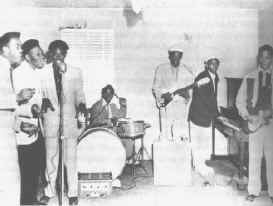
Original Flames 1956: James Brown on drums and Bobby Byrd on
piano
From their Macon Georgia base, the Flames had
been touring the South when Ralph Bass, head of Federal Records,
signed them in 1956. "Please, Please Please," their
first Federal single, was a big hit regionally and eventually
sold a million copies. Subsequent releases in the same gospel
influenced yet distinctly rougher R&B style made Brown a
regional star until "Try Me" (#1 R&B, #48
pop).became a national hit in 1958.
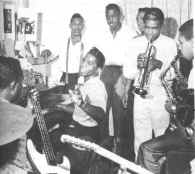
In the studio during the early days
Brown had become the leader of the groups now
called the Famous Flames. Guided by  Universal
Attractions director Ben Bart, Brown created the James Brown
Revue. The show was precisely choreographed, with Brown pumping
his hips, twisting on one foot, and doing the splits as the
troupe would execute their own intricate steps. Sweating off
seven pounds a night, breaking box office records In every major
black venue in America, Brown was nicknamed "Mr.
Dynamite" and was called "The Hardest Working Man in
Show Business".
Universal
Attractions director Ben Bart, Brown created the James Brown
Revue. The show was precisely choreographed, with Brown pumping
his hips, twisting on one foot, and doing the splits as the
troupe would execute their own intricate steps. Sweating off
seven pounds a night, breaking box office records In every major
black venue in America, Brown was nicknamed "Mr.
Dynamite" and was called "The Hardest Working Man in
Show Business".
Brown's band became one of the best in the
business. He wanted to showcase them on his records, but Federal
refused to let him use them on his records, so he arranged for
them to record for another company as Nat Kendrick and the Swans.
The resulting instrumental hit "Mashed Potatoes"
convinced King, Federal's parent company, to take over Brown's
contract and sign the James Brown Band for Brown's sessions as a
separate act. From then on Brown concentrated on pared down jump
and shout dance music.
Brown's Live at the Apollo, recorded in
Harlem in 1962 sold a million copies, unprecedented for a black
music album. Frustrated by King's failure to reach into the white
market, Brown and Byrd formed Fair Deal Productions. Fair Deal
released "Out of Sight" through Smash Records was a #1
R&B, #24 pop hit.

James Brown Show, with the Famous Flames Johnny Terry,
Bobby Byrd and Bobby Bennett up front and James Brown at the
mike.
Brown's revised contract with King in 1965 gave
him complete artistic control. He revamped the band under the
direction of Nat Jones and became a world class force in
popular music with "Papa's Got a Brand New Bag"(#1
R&B). Doing away with conventional verse and
chorus structure, eliminating chord progression, he distilled his
sound to its essence: rhythm. The following records "I Got
You (I Feel Good)" and "It's a Man's, Man's World"
also topped the R&B charts. Alfred "PeeWee" Ellis
replaced Jones as bandleader and Brown continued to have hits
with "Cold Sweat," "I Got the Feelin',"
"Say it Loud, I"m Black and I'm Proud," "Give
It Up or Turn It Loose," and "Mother Popcorn" -
which were also pop hits.
conventional verse and
chorus structure, eliminating chord progression, he distilled his
sound to its essence: rhythm. The following records "I Got
You (I Feel Good)" and "It's a Man's, Man's World"
also topped the R&B charts. Alfred "PeeWee" Ellis
replaced Jones as bandleader and Brown continued to have hits
with "Cold Sweat," "I Got the Feelin',"
"Say it Loud, I"m Black and I'm Proud," "Give
It Up or Turn It Loose," and "Mother Popcorn" -
which were also pop hits.
In the latter Sixties Brown became a cultural
hero "Soul Brother Number One". As a black man of
wealth, independence and influence, he was a symbol of
self-determination over racism. He took that responsibility
seriously with his songs containing direct socially messages. He
sponsored programs for ghetto youths, spoke at high schools,
invested in black businesses, performed for the troops in Vietnam
and went on television to plead for calm after the assassination
of Martin Luther King.

Maceo Parker
|
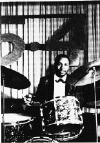
John "Jabo" Starks
|

Alfred Pee Wee" Ellis
|
In late 1969, Brown faced a mutiny by his
celebrated Sixties band , which included saxophonist Maceo Parker
and trombonist Fred Wesley. Brown hired hot young
instrumentalists, who with his nurturing, continued to develop a
sound that would be called funk. The new band called the J.B.s,
included brothers William and Phelps Collins, whose distinctive
bass and lead playing, respectively ushered in a new sound in
soul music. The Collins left after a year joining George
Clinton's Parliament Funkedelic. Key Sixties key Sixties
band members saxophonist St. Clair Pinckney and guitarist Jimmy
Nolan, as well as Parker and Wesley , eventually returned, but
the only consistent member was John "Jabo" Starks, who
had originally joined the band in 1965.
Brown had been managing himself since the death
of his manager in the late Sixties. In 1971 he signed with
Polydor Records, an international company, and sold it his entire
back catalogue. His records continued to sell in the millions.
Though R&B chart toppers, they increasingly failed to make
the pop Top Twenty.
Around 1975 Brown's popularity began to ebb.
Financial difficulties forced him to sell his three black radio
stations and jet. The U.S. government claimed he owed 4.5 million
in back taxes, his son Teddy died in a car crash in 1973, and his
second marriage ended. Young record buyers now favored heirs like
Ohio Players, Kool and the Gang, and the Parliament/Funkadelic.
When disco peaked in the late Seventies, he
promoted himself as "The Original Disco Man." A cameo
role in the 1980 film The Blues Brothers introduced
Brown to a new generation. Returning to the stage, he drew much
of his audience from the white punk-funk faction. In 1980 he
recorded "Rapp Payback," a homage to earlier singles
"Brother Rapp" and "The Payback," which
preconfigured the enormous influence he would have on the rap
scene.
By 1984 Brown's music had been claimed as the virtual basis
for hip-hop beats; among others. Kool Moe Dee and Eric B. &
Rakim had hits by sampling Brown's rhythm, and his
1969 record "Funky drummer" began appearing in a many
versions on rap and pop records. Brown revival was further
bolstered by "Living in America #4)," the theme from
Rocky IV. Recorded at the request of director Sylvester Stallone
the single won a Grammy in 1987 for Best R&B Performance. In
1989 Brown's auto biography James Brown: The Godfather of
Soul was published.
his
1969 record "Funky drummer" began appearing in a many
versions on rap and pop records. Brown revival was further
bolstered by "Living in America #4)," the theme from
Rocky IV. Recorded at the request of director Sylvester Stallone
the single won a Grammy in 1987 for Best R&B Performance. In
1989 Brown's auto biography James Brown: The Godfather of
Soul was published.
In 1988 Brown's career ground to a halt. When his
fourth wife, Adrienne, reported beatings,  Brown was
charged with assault with intent to murder and aggravated assault
and battery.. He surrendered in May to South Aiken County, South
Carolina authorities and was released on bond. Legal troubles
followed in the next year with Adrienne being arrested for
alleged possession of PCP, announcing she'd was filing for legal
separation, relenting and withdrawing the assault charges.. Then
Adrienne was was arrested again for PCP possession and arson. In
September, with rumors of his own PCP abuse and problems with
IRS, he allegedly threatened a group of people with a shotgun. An
interstate car chase with police ensued for which he received a
six year sentence in a work release program.
Brown was
charged with assault with intent to murder and aggravated assault
and battery.. He surrendered in May to South Aiken County, South
Carolina authorities and was released on bond. Legal troubles
followed in the next year with Adrienne being arrested for
alleged possession of PCP, announcing she'd was filing for legal
separation, relenting and withdrawing the assault charges.. Then
Adrienne was was arrested again for PCP possession and arson. In
September, with rumors of his own PCP abuse and problems with
IRS, he allegedly threatened a group of people with a shotgun. An
interstate car chase with police ensued for which he received a
six year sentence in a work release program.
Paroled in 1991 after serving two years of his
sentence, Brown returned to work with a pay preview television
concert and a new album. With the release of Star Time, a four CD
retrospective Brown's music was freshly available and his
critical stature was unassailable.


On November 11, 1993 Ninth Avenue in Augusta,
Georgia was renamed James Brown Boulevard in honor of Brown.
Recently a life-size bronze statue of Brown was erected and
dedicated to him here in Augusta (May 6, 05). It is on
public display in an area of Broad Street in downtown Augusta
James Brown was inducted into the Rock and
Roll Hall of Fame in 1986.
The Famous Flames were inducted into the Rock and
Roll Hall of Fame in 2012.

James Brown died on December 25, 2006 in Atlanta,
Georgia at the age of 73.


 injury ruined his chances of going pro. In the meantime,
Brown and Byrd put together a gospel group, that performed under
a number of names at the Mt. Zion Baptist Church in Tocca,
Georgia and at auditoriums in the area. Byrd and Brown sang duets
with three or four other members singing background vocals and
harmonies. After seeing a rock and roll show featuring Hank
Ballard and the Midnighters, Fats Domino, and others Brown and
Byrd quit gospel music, transforming the group into the Flames.
Each Flame sang, danced and played an instrument or two. Brown's
were piano and drums. Byrd played keyboards and vocals and would
remain Brown's sideman for the next three plus decades.
injury ruined his chances of going pro. In the meantime,
Brown and Byrd put together a gospel group, that performed under
a number of names at the Mt. Zion Baptist Church in Tocca,
Georgia and at auditoriums in the area. Byrd and Brown sang duets
with three or four other members singing background vocals and
harmonies. After seeing a rock and roll show featuring Hank
Ballard and the Midnighters, Fats Domino, and others Brown and
Byrd quit gospel music, transforming the group into the Flames.
Each Flame sang, danced and played an instrument or two. Brown's
were piano and drums. Byrd played keyboards and vocals and would
remain Brown's sideman for the next three plus decades.

 Universal
Attractions director Ben Bart, Brown created the James Brown
Revue. The show was precisely choreographed, with Brown pumping
his hips, twisting on one foot, and doing the splits as the
troupe would execute their own intricate steps. Sweating off
seven pounds a night, breaking box office records In every major
black venue in America, Brown was nicknamed "Mr.
Dynamite" and was called "The Hardest Working Man in
Show Business".
Universal
Attractions director Ben Bart, Brown created the James Brown
Revue. The show was precisely choreographed, with Brown pumping
his hips, twisting on one foot, and doing the splits as the
troupe would execute their own intricate steps. Sweating off
seven pounds a night, breaking box office records In every major
black venue in America, Brown was nicknamed "Mr.
Dynamite" and was called "The Hardest Working Man in
Show Business".
 conventional verse and
chorus structure, eliminating chord progression, he distilled his
sound to its essence: rhythm. The following records "I Got
You (I Feel Good)" and "It's a Man's, Man's World"
also topped the R&B charts. Alfred "PeeWee" Ellis
replaced Jones as bandleader and Brown continued to have hits
with "Cold Sweat," "I Got the Feelin',"
"Say it Loud, I"m Black and I'm Proud," "Give
It Up or Turn It Loose," and "Mother Popcorn" -
which were also pop hits.
conventional verse and
chorus structure, eliminating chord progression, he distilled his
sound to its essence: rhythm. The following records "I Got
You (I Feel Good)" and "It's a Man's, Man's World"
also topped the R&B charts. Alfred "PeeWee" Ellis
replaced Jones as bandleader and Brown continued to have hits
with "Cold Sweat," "I Got the Feelin',"
"Say it Loud, I"m Black and I'm Proud," "Give
It Up or Turn It Loose," and "Mother Popcorn" -
which were also pop hits.


 his
1969 record "Funky drummer" began appearing in a many
versions on rap and pop records. Brown revival was further
bolstered by "Living in America #4)," the theme from
Rocky IV. Recorded at the request of director Sylvester Stallone
the single won a Grammy in 1987 for Best R&B Performance. In
1989 Brown's auto biography James Brown: The Godfather of
Soul was published.
his
1969 record "Funky drummer" began appearing in a many
versions on rap and pop records. Brown revival was further
bolstered by "Living in America #4)," the theme from
Rocky IV. Recorded at the request of director Sylvester Stallone
the single won a Grammy in 1987 for Best R&B Performance. In
1989 Brown's auto biography James Brown: The Godfather of
Soul was published.  Brown was
charged with assault with intent to murder and aggravated assault
and battery.. He surrendered in May to South Aiken County, South
Carolina authorities and was released on bond. Legal troubles
followed in the next year with Adrienne being arrested for
alleged possession of PCP, announcing she'd was filing for legal
separation, relenting and withdrawing the assault charges.. Then
Adrienne was was arrested again for PCP possession and arson. In
September, with rumors of his own PCP abuse and problems with
IRS, he allegedly threatened a group of people with a shotgun. An
interstate car chase with police ensued for which he received a
six year sentence in a work release program.
Brown was
charged with assault with intent to murder and aggravated assault
and battery.. He surrendered in May to South Aiken County, South
Carolina authorities and was released on bond. Legal troubles
followed in the next year with Adrienne being arrested for
alleged possession of PCP, announcing she'd was filing for legal
separation, relenting and withdrawing the assault charges.. Then
Adrienne was was arrested again for PCP possession and arson. In
September, with rumors of his own PCP abuse and problems with
IRS, he allegedly threatened a group of people with a shotgun. An
interstate car chase with police ensued for which he received a
six year sentence in a work release program.

